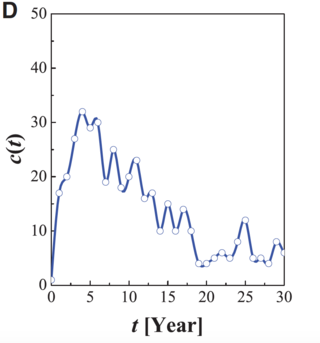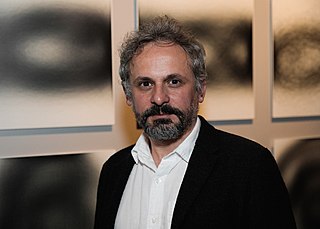
A scale-free network is a network whose degree distribution follows a power law, at least asymptotically. That is, the fraction P(k) of nodes in the network having k connections to other nodes goes for large values of k as
Scientometrics is a subfield of informetrics that studies quantitative aspects of scholarly literature. Major research issues include the measurement of the impact of research papers and academic journals, the understanding of scientific citations, and the use of such measurements in policy and management contexts. In practice there is a significant overlap between scientometrics and other scientific fields such as information systems, information science, science of science policy, sociology of science, and metascience. Critics have argued that overreliance on scientometrics has created a system of perverse incentives, producing a publish or perish environment that leads to low-quality research.

Albert-László Barabási is a Romanian-born Hungarian-American physicist, best known for his discoveries in network science and network medicine.

In the context of network theory, a complex network is a graph (network) with non-trivial topological features—features that do not occur in simple networks such as lattices or random graphs but often occur in networks representing real systems. The study of complex networks is a young and active area of scientific research inspired largely by empirical findings of real-world networks such as computer networks, biological networks, technological networks, brain networks, climate networks and social networks.
Harriet Anne Zuckerman is an American sociologist and professor emerita of Columbia University.

The Watts–Strogatz model is a random graph generation model that produces graphs with small-world properties, including short average path lengths and high clustering. It was proposed by Duncan J. Watts and Steven Strogatz in their article published in 1998 in the Nature scientific journal. The model also became known as the (Watts) beta model after Watts used to formulate it in his popular science book Six Degrees.
Human dynamics refer to a branch of complex systems research in statistical physics such as the movement of crowds and queues and other systems of complex human interactions including statistical modelling of human networks, including interactions over communications networks.

Evolving networks are networks that change as a function of time. They are a natural extension of network science since almost all real world networks evolve over time, either by adding or removing nodes or links over time. Often all of these processes occur simultaneously, such as in social networks where people make and lose friends over time, thereby creating and destroying edges, and some people become part of new social networks or leave their networks, changing the nodes in the network. Evolving network concepts build on established network theory and are now being introduced into studying networks in many diverse fields.

Linked: The New Science of Networks is a popular science book written by the Hungarian physicist Albert-László Barabási and first published by the Perseus Books Group in 2002.

In scholarly and scientific publishing, altmetrics are non-traditional bibliometrics proposed as an alternative or complement to more traditional citation impact metrics, such as impact factor and h-index. The term altmetrics was proposed in 2010, as a generalization of article level metrics, and has its roots in the #altmetrics hashtag. Although altmetrics are often thought of as metrics about articles, they can be applied to people, journals, books, data sets, presentations, videos, source code repositories, web pages, etc.
Réka Albert is a Romanian-Hungarian scientist. She is a distinguished professor of physics and adjunct professor of biology at Pennsylvania State University and is noted for the Barabási–Albert model and research into scale-free networks and Boolean modeling of biological systems.

Scientific collaboration network is a social network where nodes are scientists and links are co-authorships as the latter is one of the most well documented forms of scientific collaboration. It is an undirected, scale-free network where the degree distribution follows a power law with an exponential cutoff – most authors are sparsely connected while a few authors are intensively connected. The network has an assortative nature – hubs tend to link to other hubs and low-degree nodes tend to link to low-degree nodes. Assortativity is not structural, meaning that it is not a consequence of the degree distribution, but it is generated by some process that governs the network’s evolution.
The Erdős–Rényi Prize of the Network Science Society is named for Paul Erdős and Alfréd Rényi. This international prize is awarded annually in a special ceremony at the International Conference on Network Science to an outstanding early-career researcher in the field of network science.

Individual human mobility is the study that describes how individual humans move within a network or system. The concept has been studied in a number of fields originating in the study of demographics. Understanding human mobility has many applications in diverse areas, including spread of diseases, mobile viruses, city planning, traffic engineering, financial market forecasting, and nowcasting of economic well-being.

Altmetric, or altmetric.com, is a data science company that tracks where published research is mentioned online, and provides tools and services to institutions, publishers, researchers, funders and other organisations to monitor this activity, commonly referred to as altmetrics. Altmetric was recognized by European Commissioner Máire Geoghegan-Quinn in 2014 as a company challenging the traditional reputation systems.
The International School and Conference on Network Science, also called NetSci, is an annual conference focusing on networks. It is organized yearly since 2006 by the Network Science Society. Physicists are especially prominently represented among the participants, though people from other backgrounds attend as well. The study of networks expanded at the end of the twentieth century, with increasing citation of some seminal papers.

Citation dynamics describes the number of references received by the article or other scientific work over time. The citation dynamics is usually described by the bang, that take place two–three years after the work has been published, and the burst size spans several orders of magnitude. The presence of bursts is not consistent with other models based on preferential attachment. Those models are able to account for the skewed citation distribution but their reference accumulation is gradual.

Mauro Martino is an Italian artist, designer and researcher. He is the founder and director of the Visual Artificial Intelligence Lab at IBM Research, and Professor of Practice at Northeastern University.
Roberta Sinatra is an Italian scientist and associate professor at the IT University of Copenhagen. She is known for her work in network science and conducts research on quantifying success in science.
Brian Uzzi is an American sociologist and the Richard L. Thomas Professor of Leadership at the Kellogg School of Management, Northwestern University. He is known for his work on problems in the fields of sociology, network science, the science of science, and complex systems. He is the co-director of the Northwestern Institute on Complex Systems (NICO), is a professor of sociology, and a professor of Industrial Engineering and Management Sciences at the McCormick School of Engineering. Since 2019, Uzzi has written a column for Forbes on Leadership and artificial intelligence.







